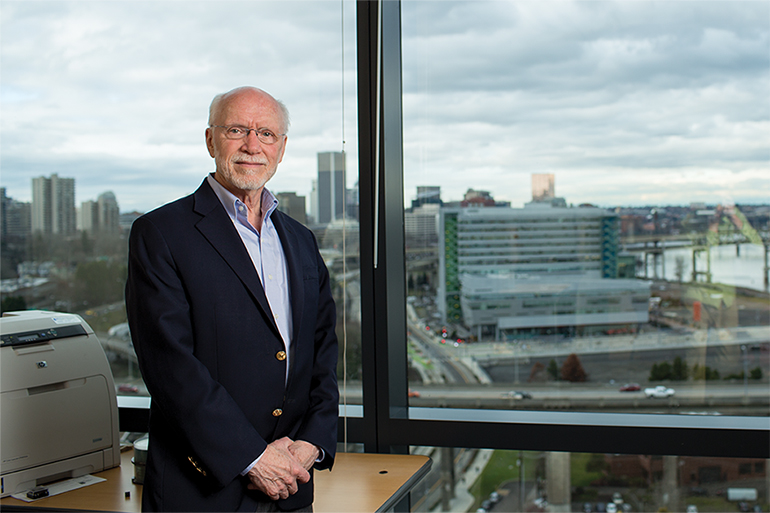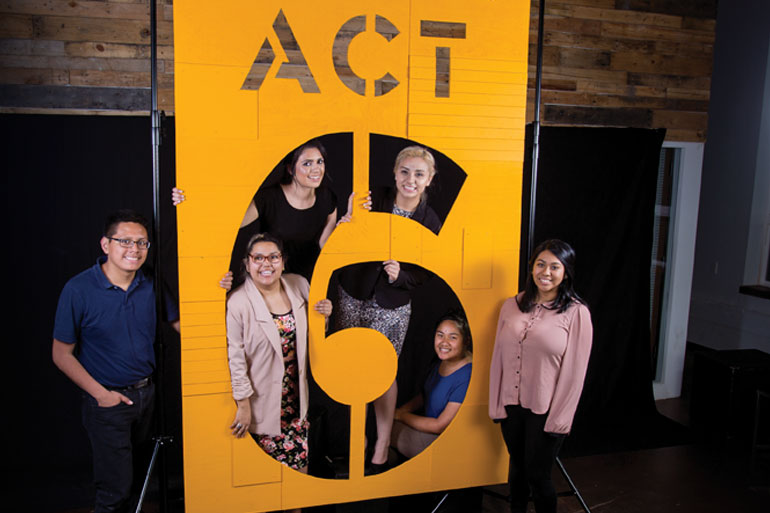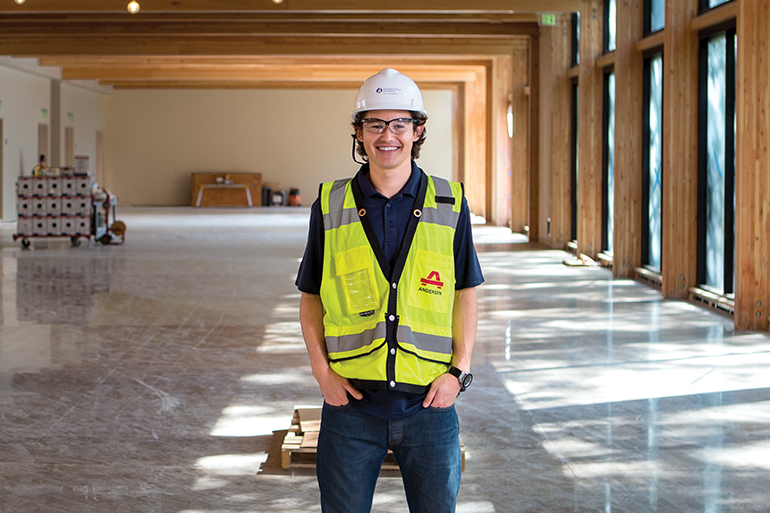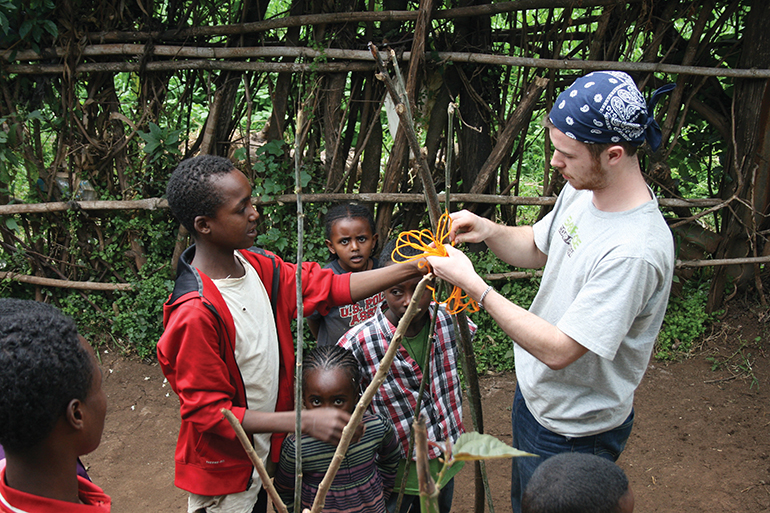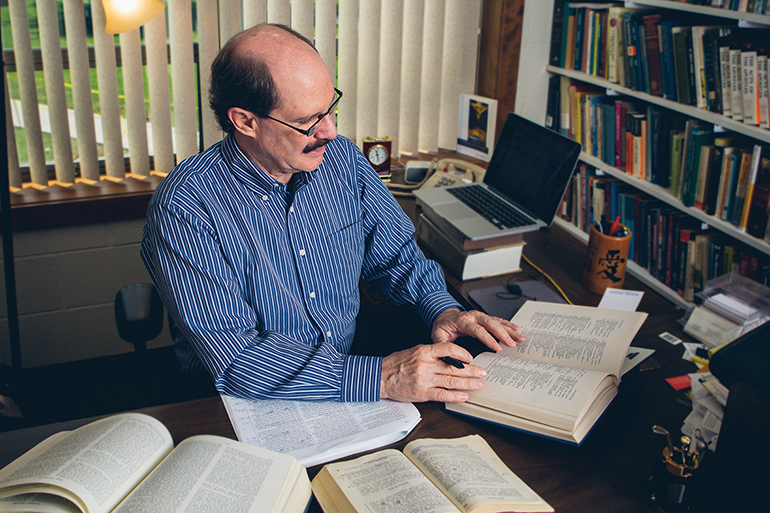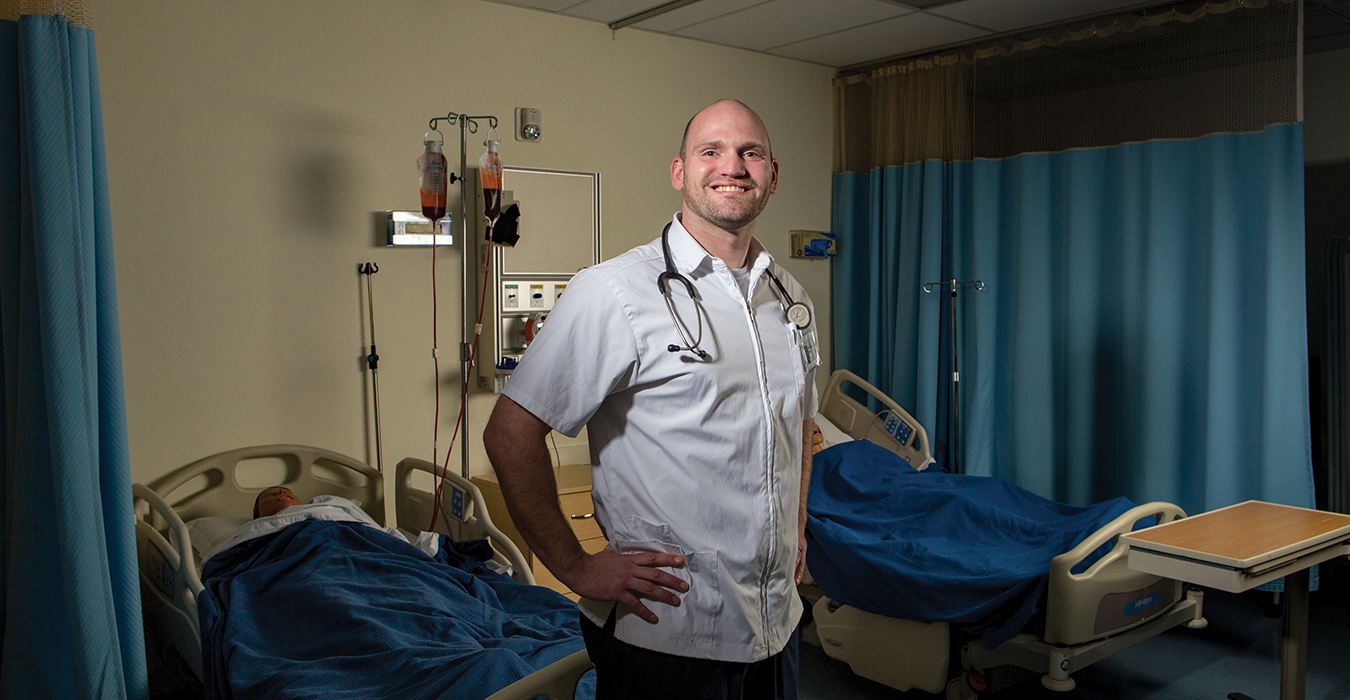
'This is Why I'm Here'
Chris Richey plans to use his George Fox nursing degree to help war veterans
By Brett Tallman
Chris Richey doesn’t look like a gymnast. And he isn’t. With broad shoulders and thick wrists, he looks like a catcher, maybe, or a fullback. And with his hair clipped tight to his scalp, he looks like a Marine – which he is. Yet the former medic chooses to explain, by analogy, his mental preparation for combat in the terms of a gymnast.
“Actually, I saw it on TV,” Richey says. “I was bored one night and there was a documentary on about gymnasts. Before they started a routine, they would just think about it. They would play it out in their head first, and their body would know how to act. It made perfect sense because it was exactly what I had been doing.”
Though it wasn’t part of his training during the nine months Richey spent in Iraq, he was constantly asking himself, “What could happen next?” and “How would I handle this?” So when a suicide VBIED (vehicle-born improvised explosive device) exploded between Richey’s Humvee and a bus carrying Iraqi soldiers, he had already rehearsed the scenario in his head.
“The vehicle was headed the opposite way on a highway outside Ramadi,” Richey recalls. “Adrenaline kicked in as soon as I saw it swerve in our direction. Our gunner started shooting. We all knew what was happening. Then I heard an explosion behind us.”
Inside the Humvee, Richey and three Marines were safe from the blast. The bus behind them, however, had been the target. “The sergeant and I got out to assess the situation. It was an eye-opener. I remember thinking, ‘OK, this is why I’m here.’”
Twenty-four people – the front third of the bus – were dead or wounded. The driver had been decapitated. Richey was looking at Iraqi soldiers with abdominal lacerations and missing limbs. Just two weeks in, he had to determine who could be saved and who could not.
“The hardest part was the language barrier,” he says. “The only way I could communicate – the only way I could calm them down – was with hand gestures. One guy had glass in his eyes and I had to convince him to sit down, and then flush his eyes with water. He wouldn’t trust me. I realized that before he would listen, I had to show him the water was OK. I had to take a drink of the water I wanted him to rinse his eyes with. Then I had to go to the next guy and do it over again.”
Along with the rest of the 2nd Battalion, 11th Marine Division, Richey was deployed to Camp Ramadi in 2006. The base was situated on the outskirts of the Iraqi city of the same name where the 11th, normally an artillery division, provided convoy security.
Richey is quick to point out that a Marine medic, called a field trauma specialist, is actually a Navy corpsman attached to a Marine unit. He went to boot camp with the Navy, received his medical training from both Marine and Navy doctors, and wore some, but not all, of the dress uniforms from both branches.
I remember the stress levels, and I can see where [a veteran suffering from PTSD] is at because I’ve dealt with it in my Marines.”
None of that mattered in the field. Richey’s role in his unit was to care for every aspect of a Marine’s well-being. “Over there, we were mom,” he says.
Richey left the military in June of 2007. It has been nine years since he served in Iraq, but there is immediacy to his stories. The details are clear and vivid, but not rehearsed.
The years after 2007, however, have been hazy, if not unaccounted for. Following his discharge, Richey spent time in the active reserve. He was sent to Trinidad and Tobago, and later to the Caribbean on joint-services humanitarian operations. Eventually, he moved back to Beaverton, Ore., and took a job driving a tow truck for AAA. He made decent money and liked the work, but, encouraged by his wife, Cortlyn, he decided to go back to school.
Ultimately, Richey hopes to become a psychiatric-mental health nurse practitioner, or PMHNP. It will require three years of graduate work on top of the two years he has left at George Fox. But, in addition to the autonomy that comes with the title nurse practitioner, Richey would be able to offer veterans a combination of physical and mental care like he once provided for Marines at Camp Ramadi.
Richey sees a bigger pattern for his life unfolding, but he is more interested in talking about the present. After all, at the time of his magazine interview spring finals were just a few days away, and the demands of the nursing program don’t leave much time for gazing into the future.
“The nursing program is a full-time job,” he says. “If you’re not in class, you’re in clinicals. And if you’re not in clinicals, you’re studying.”
That doesn’t mean he isn’t trying to incorporate veterans into his time at George Fox. Richey’s clinical instructor, Angela Russell, works at the VA hospital in Portland.
“There is an instant camaraderie with vets – with anyone in their circles, really,” he says, “so Angela and I hit it off right away.”
Richey hopes to follow in Russell’s footsteps, but right now the VA hospital only accepts nursing students from OHSU and Portland State. With Russell’s help, he hopes to change that. “It’s challenging,” says Richey of his aspirations, “but the nursing program here makes it possible because of the teaching staff. We learn through their nursing experience, and they are kind and generous with their time.”
He knows that at a veterans hospital he would be useful in a way that most people can’t understand. “I have a different view of the situation,” he says. “I remember the stress levels, and I can see where [a veteran suffering from PTSD] is at because I’ve dealt with it in my Marines.”
If they pull it off, Richey will be one step closer to his ultimate goal. But, in a small way, his work will have already circled back during his time at George Fox to that most vivid part of his life. For now he’s going from class to clinicals, and back to studying before he does it all over again.
“You know, I was never a good student,” he says. “I could never see the point. But with this, there’s a purpose.”
Bruin Notes
- University Readies to Celebrate 125 Years
- Study Shows University Generates $140 Million for Local Economy
- News Bits
- Powers Publishes Landmark Findings on Heat Dissipation in Hummingbirds
- George Fox, Newberg Ranked Highly for Safety
- Gift Brings ‘The Saint John’s Bible’ to Campus for Second Year
- Plans Announced for New Student Activity Center
- University Honors Top Teachers, Researchers




